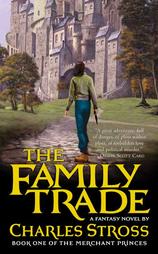 I’ve just started re-reading the first books of Charlie Stross’ “Merchant Princes” series. I haven’t found them that easy to get hold of in the UK, unfortunately. All those I have are imported US Mass Market paperbacks, and I have yet to get hold of the final volume “A Trade of Queens”. This series is further proof Stross is a very versatile writer. Not only has he written space opera, near-future technothrillers, and the excellent darkly humorous HP Lovecraft/Ian Fleming/Scott Adams mashup that is The Laundry books, but he’s also trying his hand at fantasy.
I’ve just started re-reading the first books of Charlie Stross’ “Merchant Princes” series. I haven’t found them that easy to get hold of in the UK, unfortunately. All those I have are imported US Mass Market paperbacks, and I have yet to get hold of the final volume “A Trade of Queens”. This series is further proof Stross is a very versatile writer. Not only has he written space opera, near-future technothrillers, and the excellent darkly humorous HP Lovecraft/Ian Fleming/Scott Adams mashup that is The Laundry books, but he’s also trying his hand at fantasy.
The story revolves around “The Clan”, an extended group of families who possess the hereditary power of World Walking, a quasi-magical ability to move between worlds. They have used this ability to grow rich by trading, becoming the Merchant Princes of the title. Most of the action takes place across three parallel worlds, one of them being our own, the others having histories that diverged from ours hundreds of years ago,
I love the way Stross knowingly uses so many tropes that have become bad clichés in the hands of lesser authors. There’s an ordinary person from our own world magically transferred into a fantasy setting. It’s got a pseudo-medieval dynastic soap-opera. It’s got alternative history, complete with airships. It’s even got the hoary old plot device of character from a humble background who discovers’s she’s a princess. But then he goes and subverts them all. The princess isn’t a naive teenager but a worldly-wise and highly educated thirty-something divorcee. The feuding Clan are explicitly compared with Arab oil sheiks or the Mafia. And most significantly of all, going against all conventions of the genre, the fantasy setting has believable economics.
It’s been compared with Roger Zelazny’s “Amber”, but for me it actually delivers what Amber promised but failed to. It’s got all the brutal dynastic politics, but rather than Amber’s insubstantial ‘shadows’, the worlds in which the Merchant Princes operate are fully realised with enough detail and colour that it feels like Stross takes you there with them. Stross is a writer who believes strongly in worldbuilding such that the setting becomes an important part of the story. And it shows.
The central character, Miriam, is another of Stross’s strong-willed and independent female leads, in much the same mould as Rachel Mansour from “Singularity Sky” and “Iron Sunrise”. Through her we meet a rich cast ranging from the morally ambiguous to the blackest villainy, As the series progresses the viewpoint pans out so that we see things from the perspective of many more characters, and one major villain turns out to be a significant figure from our own world.
While billed as fantasy, with an emphasis on the very character-driven dynastic politics, it still reads like quite hard SF in many places. The emphasis given to the way the economies of the worlds function is an aspect of this. But you see the same approach later in the series when a faction of The Clan try to determine the true nature of their world-walking ability.
The one big flaw in the series (and bear in mind I have yet to read the last volume), is the way the story is chopped-up to fit the demands of American publishing, especially the printing technology used which restricts the length of each volume. Not one of the books works as a standalone novel. As Stross once explained on his blog, the whole thing was originally conceived as two separate 600 page novels.The first two, “The Family Trade” and “The Hidden Family” read as a single 600 page story split across two books. But what was to have been the second 600 page book ended up ballooning into four volumes, partly to end each book on a cliffhanger, and partly because having to recap on things expanded the word count.
Despite those structural flaws, the first five books make for a well-written and thought-provoking series. As for the final book, I’ll give my verdict once I’ve read it.
